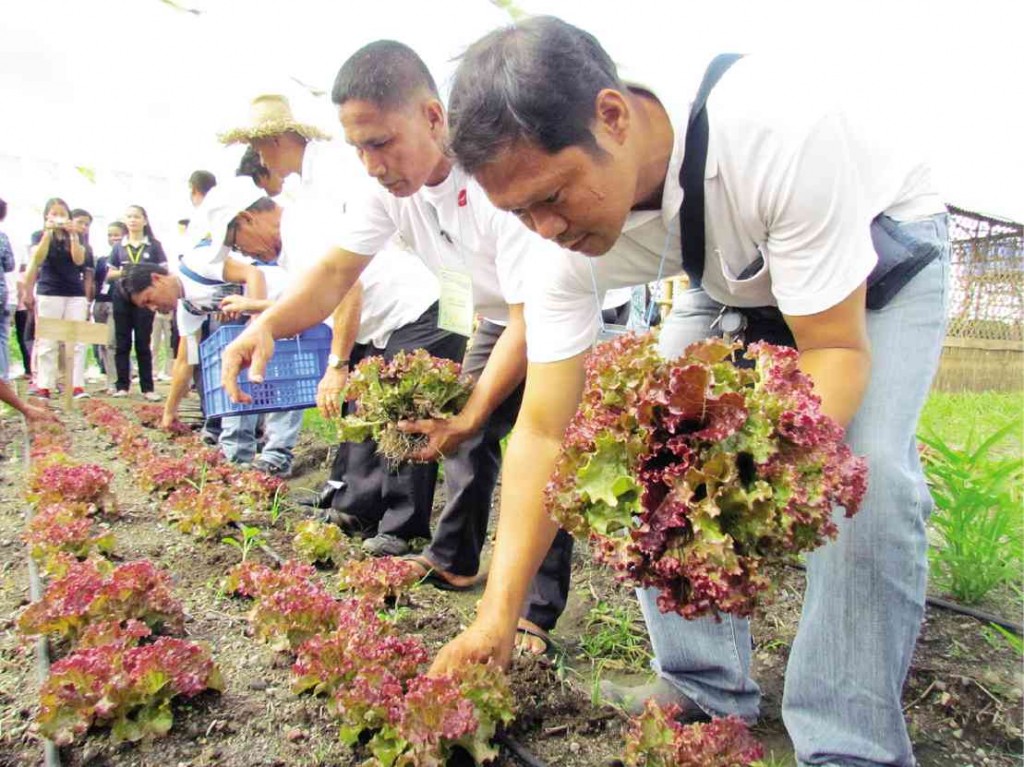Marginalized farmers get lessons on sufficiency

HARVEST TIME Beneficiaries of SM Foundation Inc.’s farmer training program from Lambunao town, Iloilo province, harvest red lettuce during a harvest festival. The activity recognizes the success of the training, as manifested by the bountiful harvest from the demonstration farm.
Small farmers in the Philippines are being hit hard by the influx of imported goods, including agricultural products.
It is not only their lack of access to the market that is affecting their ability to compete but also the subpar quality of their produce due to the absence of technology needed to stay ahead of stiff competition in the market.
To help these small farmers, SM Foundation Inc. (SMFI) rolled out a corporate social responsibility project called Kabalikat sa Kabuhayan (KSK) Farmers’ Training Program.
It was SM founder Henry Sy Sr. who first thought of helping alleviate the condition of marginalized farmers—and that is by increasing the output and quality of their fruits and vegetables.
KSK Farmers’ Training Program was launched in May 2007 in Bacolod City.
Article continues after this advertisementAbout 102 farmers from eight municipalities and 36 barangays in Negros Occidental province have graduated and have since shared their own success stories.
Article continues after this advertisementBecause of the success and testimonials of the farmer-graduates, SMFI has continued the program.
From an initial 102 graduates in 2007 from one area, it rose to 623 the following year and swelled to 1,260 after two years covering Luzon and the Visayas.
To date, it has covered 80 areas, including Mindanao, servicing 461 cities and municipalities.
It has reached out to close to 10,000 farmers, with 8,881 graduating from the program as of August this year.
The training program involves a dual-tech training system where farmers are taught the basic principles of farming, from soil preparation and seedling production to pruning, crop protection and nutrition, harvesting and marketing.
Actual field practice strengthens the understanding of the simple techniques taught to the farmers.
To see the program through, SMFI has partnered with Harbest AgriBusiness Corp., which conducts 12 weekly sessions on the farming of high-value crops, fruits and vegetables.
It is also responsible for monitoring the progress of individual participants to make sure they are learning the technology and that the technology is being applied the right way.
It also conducts a follow-up activity, through a forum, to update farmers on different farming technologies.
The Department of Agriculture (DA), on the other hand, provides additional technical assistance through its regional office or local government counterpart, apart from also offering additional seeds and supplies to the farmers.
The DA likewise selects participants through its provincial and local agricultural offices.
Local government units also play important roles, primarily in the provision of a 5,000 square-meter demonstration farm for the season-long training, complete with tents, chairs and sound system during training sessions.
They also help identify qualified farmer-participants.
Following the success of its projects in various parts of the country, the program further expanded in 2013, with government and nongovernment organization partners coming in to reach out to more beneficiaries.
That year marked some innovations in the program, with a formal partnership with the Department of Social Welfare and Development (DSWD) through its Sustainable Livelihood Program and Pantawid Pamilyang Pilipino Program (4Ps). Under a memorandum of agreement, SMFI will set aside 50 slots in every batch for 4Ps beneficiaries.
In turn, the DSWD will conduct Community-driven Enterprise Development sessions for all the training’s participants.
One of the key elements of the program’s success is SMFI’s commitment to create market linkages for these farmers. The foundation has initiated an event called Buyer’s Forum in partnership with SM Food Group’s suppliers—SM Hypermarket, SM Supermarket, Savemore and Walter Mart. When there is a need, SM Food Group finds ways to buy directly from the farmer-graduates.
SMFI also funds the dual technology and hands-on training being conducted by Harbest Agribusiness, including the provision of logistical requirements for the 5,000 sq m demo farm that include all direct inputs, like seeds; mulching film; seedling trays; trellising nets; bamboo poles; bamboo seedling nurseries; organic fertilizers, insecticides and fungicides; effective microorganisms, and other supplies for planting.